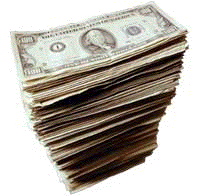 |
April 17, 2007 (Associated Press)
TOKYO - At a time when Detroit's Big Three are closing plants and slashing jobs to revive their ailing business, their Japanese counterparts are busy opening plants in Japan for the first time in decades.
That's because there's strong demand for fuel-efficient small cars such as the Toyota Yaris and Honda Fit -- all of which are made in Japan -- as well as luxury models and hybrids, most of which are made here.
But there's also a shift away from the conventional wisdom that automakers are best off making cars in the same region where they sell.
AntiSpin: Political changes in Japan bear watching. The first Japanese premier in more than 50 years who was born after WWII won the last election on a platform that included greater independence from the US. Japan will develop its own military, with it, its own military industrial complex.
Why build cars in the US when Japan can build them in Japan? Or China? In terms of trade, Japan is now exporting more to China than to the US, and developing tight political relations. When the yen is on the rise, and the dollar on the way down, now is the time to shift labor policy to focus on domestic production.
If US manufacturers aren't going to increase employment of American auto workers and the Japanese aren't, who will? The Koreans? The Chinese? It's likley to keep getting harder to point to where new non-Fire Economy jobs are going to come from.
 |
April 17, 2007 (Reuters)
Inflation is uncomfortably high and the U.S. central bank needs to remain vigilant about it, Philadelphia Federal Reserve Bank President Charles Plosser said on Tuesday.
Plosser, regarded as one of the more hawkish among Fed policy-makers, said that inflation was not coming down fast enough.
"Inflation is uncomfortably high from my perspective and not declining as rapidly as I'd like to see it," he told a meeting of business executives hosted by Rutgers School of Business.
He said he was not sure if the annual inflation rate would moderate toward 2 percent, but did not specify what inflation gauge he was referring to.
AntiSpin: The Fed can talk about inflation any way it wants because the term "inflation" no longer has meaning. Government inflation numbers are now so abstract, so completely a matter of interpretation of measures which themselves are based on opinion–hardly disinterested–of what is and is not relevant to measure, such is what is "core," what is "volatile," what is "increasing in utility," and what merely costs more dollars to buy. You may ask, how did the discussion of inflation deteriorate to the level of children arguing whether a certain cloud floating the in the summer sky looks like an elephant or a rabbit? But here we are.
Inflation is now entirely about managing expectations. If everyone expects it, everyone gets it. A Fed official saying that he is worried about inflation is in fact telling the markets not to worry about it because the Fed is on the case. The Fed is forever trying to talk inflation expectations down, except when it's trying to talk them up. If Fed officials aren't saying they are worried about inflation, and are worried about "deflation" as they said they were in 2001, that means back up the truck and buy gold, the Fed's about to spin up a few terabytes of money–time to acknowledge that it's time to drop the references to printing presses.
 |
2007/4/17 (William Pesek - Bloomberg)
Economists don't like to admit to being stunned by anything, even in unpredictable Asia. Last week, UBS AG's Jonathan Anderson couldn't seem to help himself.
The cause of the Hong Kong-based economist's dismay: China's currency reserves rose US$1 million a minute in the first quarter.
"This is more than just a jump," Anderson said in a report released Sunday. "The magnitude and the abruptness of this acceleration are simply stunning."
AntiSpin: The greatest challenge for the Fed in this game is that the economy is slowing rapidly in some ways but not in others. The retail sales numbers are impressive and don't suggest a recession in the offing. Stock market inflation is doing nicely. Housing inflation is moderating, but not crashing–yet. That will depend on employment, which depends on government spending, which depends on foreign lending. Which takes us full circle back to our first story, Japan. Japan threw the bonar support hot potato to China back in 2004. They have been tossing it from left hand to right ever since while looking for another US trade partner to toss it to. At $1 million bonars per minute, Hank's (as in Henry Paulson, US Secretary of the Treasury, previously CEO Goldman Sachs) delay the delay in making arrangements for a suitable catcher is getting painful.
Prof. Peter Morici (we last spoke to him in January) put it best today: "The Federal Reserve will not likely be able to accomplish both moderate inflation and reasonable GDP and employment growth. Faced with choosing between instigating a recession or an inflation spiral it cannot much slow, the best policy course will be to do nothing."
Long term, doing nothing will not be an option, as that way leads to both recession and inflation.

 So much left over easter merchandise of all types. What happended to targeting the higher end customer.:confused:
So much left over easter merchandise of all types. What happended to targeting the higher end customer.:confused:
Comment